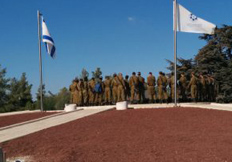Year Course Mt. Herzl – Two Perspectives

In late September, Rabbi Rob Kahn led his Zionist History class to Mt. Herzl in Jerusalem for a siyur, or trip, into the origins of Modern Zionism. Below are two reflections from the trip written by two of Rob’s students.
[ezcol_1half]
Is Israel living up to Herzl’s dream?
by Naomi Solkowitz
As a Judaean I have spent a lot of time learning about Theodore Herzl by reading the Zionist idea, visiting Har Herzl on Machon (Young Judaea’s Summer Program in Israel), but today, after visiting Har Herzl I started to wonder whether Israel is truly living up to Herzl’s dream.

Herzl’s plan was to give the Jews sovereignty and create a state for the Jews. This is where the first issue comes up. Is Israel a “State for the Jews” or a “Jewish State”? Israel is a Jewish State. Israeli law is based on Jewish law and Jewish values and Jewish holidays are national holidays. Restaurants are kosher, buses do not run on Shabbat and Ben Gurion airport closes on Yom Kippur. Of course these are all generalizations, but they are all little things that make Israel a Jewish State.
In Herzl’s writing when approached with the question about language he says “We cannot converse with one another in Hebrew.” Herzl wanted a common language to be spoken. Herzl wanted “those miserable stunted jargons” to be lost. Herzl’s idea of Political Zionism included Israel being a great, exemplary nation that would be able to work with other countries, but he did not think Israel could be that nation if they spoke a dead language. Furthermore, Hebrew is another example of how Israel is a Jewish State, and not a State for the Jews. The Jewish People in Israel brought back Hebrew to revive their religion and culture.
Getting to the big question, Herzl’s goal in his Zionist idea was to get rid of Anti-Semitism, “if we only begin to carry out the plans, Anti-Semitism would stop at once and for ever. For it is the conclusion of peace.” Look at what is happening in Europe, more specifically in England and France. Of course Israel is always a safe haven for people to escape Anti-Semitism, but the creation of the State of Israel absolutely did not stop Anti-Semitism. In that sense Israel was a failure to the Jewish Question.
Although there are many things that Israel does not fulfill according to Herzl’s dream, Jews have their sovereignty and have a place to go to escape Anti-Semintism. Israel, while it has many flaws, is still an exemplary country with many Start Ups and achievements in the world.
[/ezcol_1half]
Herzl and Ahad Ha’am: Contrasting Visions
By Dana Little
The second siyur that Rob Kahn’s Zionism class went on was to Mount Herzl. This was convenient being that Herzl was the founding father of Zionism. An outline of the day was: visited Herzl’s grave, read inserts of Herzl’s plan to establish the state of Israel, toured the Herzl museum, answered questions about Herzl, read about Asher Ginsberg (Ahad Ha’am), compared and contrasted his plan of establishing Israel to that of Herzl’s and said our closing words around the grave of Herzl.
I learned a lot on this trip both about Herzl and the establishment of the state of Israel. Herzl was not the first person to call for the creation of a Jewish state, however he created a movement that marked out a path exactly how to do so. He led the Zionist movement from 1897 until his death in 1904. He wrote down specifically what he envisioned the state of Israel, the Jewish homeland, in Der Judenstaat. He believed that with the establishment of the Jewish state, people could come together in an environment free of racial Anti-Semitism. He was the founder of political Zionism.
I found the Herzl museum very interesting, informative and effective. It was a very unique museum for it was a motion picture telling the story of an actor rehearsing for his role as Herzl. After the museum, we read an insert of Ahad Ha’am. We learned that Ahad Ha’am did not agree with much of what Herzl recommended, rather he criticized most of it and thought differently. He believed that with the creation of small Jewish settlements, that would lead to a state. Also, with the state of Israel, it would help reinforce Jewish life in the Diaspora.
Ahad Ha’am was the founder of cultural Zionism. Together as a class, we charted the differences between Herzl and Ahad Ha’am. They contrasted in certain ways such as Herzl said the language of the Jewish state would be the majority of what the people were speaking, however Ahad Ha’am said Hebrew. Herzl said the location of the Jewish state was less important than the fact of its existence, while Ahad Ha’am insisted that it be in Israel. By contrasting the two leaders, we were able to make some conclusions about which parts of Israel were influenced by which leader. The last moments of the siyur, we watched as groups of soldiers paid homage to Herzl’s grave. As a class, we then surrounded his grave and said some last words. This siyur helped me connect to Israel in a way that I was proud. I was proud for what Israel, as a state, had accomplished. Even though Herzl was not alive to witness the establishment of Israel in 1948, his dreams for a Jewish state ultimately came true. This gives me a good feeling
